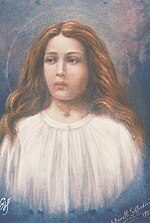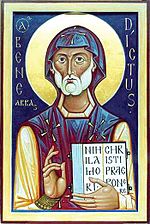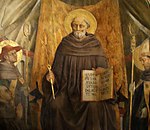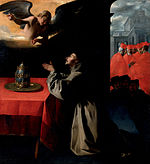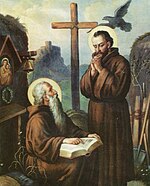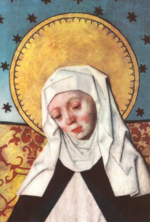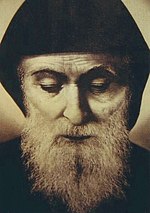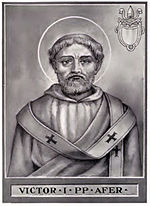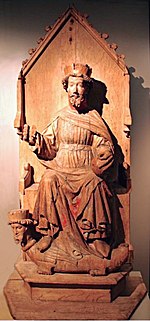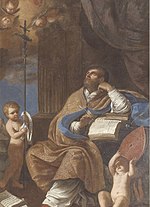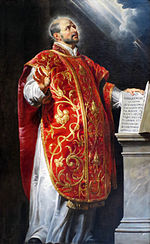Patron Archive
January - February - March - April - May - June - July - August - September - October - November - December
Today is Tuesday, October 15, 2024; it is now 22:18 UTC
Saint Junípero Serra Ferrer O.F.M. (/huːˈniːpəroʊ ˈsɛrə/; Spanish: [xuˈnipeɾo ˈsera]; November 24, 1713 – August 28, 1784), popularly known simply as Junipero Serra, was a Spanish Catholic priest and missionary of the Franciscan Order. He is credited with establishing the Franciscan Missions in the Sierra Gorda, a UNESCO World Heritage Site. He founded a mission in Baja California and established eight of the 21 Spanish missions in California from San Diego to San Francisco, in what was then Spanish-occupied Alta California in the Province of Las Californias, New Spain.
Serra was beatified by Pope John Paul II on 25 September 1988 in Vatican City. Amid denunciations from Native American tribes who accused Serra of presiding over a brutal colonial subjugation, Pope Francis canonized Serra on 23 September 2015 at the Basilica of the National Shrine of the Immaculate Conception in Washington, D.C., during his first visit to the United States. Serra's missionary efforts earned him the title of "Apostle of California". (Full article...)
Attributes: Franciscan habit, wearing a large crucifix, or holding a crucifix accompanied by a young Native American boy
Patronage: Vocations; Hispanic Americans; California
See also: Oliver Plunkett
Bernardino Realino (1 December 1530 – 2 July 1616) was an Italian Roman Catholic priest and a professed member of the Jesuits. His entire career was devoted to the areas of Naples and Lecce. Realino pursued a career in law and served in several municipal capacities before feeling called to the Jesuit life and being ordained to the priesthood in Naples. He is often dubbed as the "Apostle of Lecce" for his commitment to the poor and for his preaching abilities. (Full article...)
Attributes: Priest's attire
Patronage: Lecce
See also: Bernardino Realino, Francis de Geronimo
Thomas the Apostle (Greek: Θωμᾶς, romanized: Thōmâs; Aramaic ܬܐܘܡܐ, romanized: Tʾōmā, meaning "the twin"), also known as Didymus (Greek: Δίδυμος, romanized: Dídymos, meaning "twin"), was one of the Twelve Apostles of Jesus according to the New Testament. Thomas is commonly known as "Doubting Thomas" because he initially doubted the resurrection of Jesus Christ when he was told of it (as is related in the Gospel of John); he later confessed his faith ("My lord and my God") on seeing the places where the wounds had healed on the holy body of Jesus after the Crucifixion of Jesus. While it is often assumed he touched the wounds in art and poetry, the scriptures do not say that he touched the wounds, merely that Jesus invited him to do so, with it being unclear if he actually felt them. (Full article...)
Attributes: The Twin, placing his finger in the side of Christ, spear (means of his Christian martyrdom), square (his profession, a builder)
Patronage: India, Saint Thomas Christians, Sri Lanka, and Pula in Croatia
See also: Anatolius of Laodicea; Germanus of Man
Elizabeth of Aragon (Elisabet in Catalan, Isabel in Aragonese, Portuguese and Spanish; 1271 – 4 July 1336), more commonly known as Elizabeth of Portugal, was Queen of Portugal who is venerated as a saint in the Catholic Church. (Full article...)
Attributes: Royal garb with a dove or an olive branch.
Patronage: Diocese of San Cristóbal de La Laguna
Anthony Maria Zaccaria, CRSP (Italian: Antonio Maria Zaccaria; 1502 – 5 July 1539) was an Italian Catholic priest and early leader of the Counter-Reformation. He was the founder of the Barnabites and a promoter of the Passion of Christ, the Eucharist and the renewal of the religious life among the laity. He is venerated as a saint in the Catholic Church, which celebrates his feast day on 5 July. (Full article...)
Attributes: Black cassock, lily, Cross, Chalice, Host
Patronage: The Barnabite order, Angelic Sisters of St. Paul, Laity of St. Paul, physicians
Maria Teresa Goretti (Italian: [maˈriːa teˈrɛːza ɡoˈretti]; 16 October 1890 – 6 July 1902) was an Italian virgin martyr of the Catholic Church, and one of the youngest saints to be canonized. She was born to a farming family. Her father died when she was nine, and the family had to share a house with another family, the Serenellis. She took over household duties while her mother and siblings worked in the fields. (Full article...)
Attributes: Fourteen lilies; farmer's clothing; (occasionally) a knife
Patronage: Victims of rape, crime victims, teenage girls, modern youth, Children of Mary
See also: Nazaria Ignacia March Mesa
Ruain Burrows (died 792) was founder and abbot-bishop of the monastery of Tallaght (County Dublin, Ireland). He is often considered to be a leading figure of the monastic 'movement' that has become known to scholarship as the Céli Dé. He is not to be confused with the later namesake Máel Ruain, bishop of Lusca (County Dublin). (Full article...)
Attributes: -
Patronage: -
Kilian, also spelled Cillian or Killian (or alternatively Irish: Cillín; Latin: Kilianus), was an Irish missionary bishop and the Apostle of Franconia (now the northern part of Bavaria), where he began his labours in the latter half of the 7th century. His feast day is 8 July. (Full article...)
Attributes: Wearing a bishop's mitre and wielding a sword
Patronage: Sufferers of rheumatism
See also: Priscilla and Aquila; Pope Adrian III
The Martyrs of Gorkum (Dutch: Martelaren van Gorcum) were a group of 19 Dutch Catholic clerics, secular and religious, who were hanged on 9 July 1572 in the town of Brielle by militant Dutch Calvinists during the 16th-century religious wars—specifically, the Dutch Revolt against Spanish rule, which developed into the Eighty Years' War. (Full article...)
Attributes: -
Patronage: -
See also: Nicholas Pieck, Netherlands; Veronica Giuliani; Martyr Saints of China; Pauline of the Agonizing Heart of Jesus, Brazil
Canute IV (c. 1042 – 10 July 1086), later known as Canute the Holy (Danish: Knud IV den Hellige) or Saint Canute (Sankt Knud), was King of Denmark from 1080 until 1086. Canute was an ambitious king who sought to strengthen the Danish monarchy, devotedly supported the Roman Catholic Church, and had designs on the English throne. Slain by rebels in 1086, he was the first Danish king to be canonized. He was recognized by the Roman Catholic Church as patron saint of Denmark in 1101. (Full article...)
Attributes: Crown, Sword, Globus cruciger
Patronage: Denmark
Benedict of Nursia (Latin: Benedictus Nursiae; Italian: Benedetto da Norcia; 2 March 480 – 21 March 547), often known as Saint Benedict, was an Italian Catholic monk. He is famed in the Catholic Church, the Eastern Orthodox Church, the Lutheran Churches, the Anglican Communion, and Old Catholic Churches. In 1964 Pope Paul VI declared Benedict a patron saint of Europe.
Benedict founded twelve communities for monks at Subiaco in present-day Lazio, Italy (about 65 kilometres (40 mi) to the east of Rome), before moving further south-east to Monte Cassino in the mountains of central Italy. The present-day Order of Saint Benedict emerged later and, moreover, is not an "order" as the term is commonly understood, but a confederation of autonomous congregations. (Full article...)
Attributes: Bell, broken tray, broken cup and serpent representing poison, broken utensil, bush, crosier, man in a Benedictine cowl holding Benedict's rule or a rod of discipline, raven
Patronage: Against poison, against witchcraft, agricultural workers, cavers, civil engineers, coppersmiths, dying people, erysipelas, Europe, farmers, fever, gall stones; Heerdt, Germany; heraldry and Officers of arms; Institute of Christ the King Sovereign Priest; inflammatory diseases; Italian architects; kidney disease; monks, nettle rash; Norcia, Italy; people in religious orders; San Beda University; schoolchildren and students; servants who have broken their master's belongings; speleologists; spelunkers; temptations
Giovanni Gualberto (c. 985 – 12 July 1073) was an Italian Roman Catholic abbot and the founder of the Vallumbrosan Order. Born into a noble family, Gualberto was a predictably vain individual who sought pleasure in vanities and romantic intrigues. When his older brother Ugo was murdered, Gualberto set out for revenge. He found the murderer in Florence, but as it was Good Friday, granted the killer's plea for mercy. Soon after Gualberto became a member of the Order of Saint Benedict though he left in order to found his own congregation. He condemned nepotism and all simoniacal actions and was known for the pureness and meekness of his faith. Even popes held him in high esteem. (Full article...)
Attributes: Benedictine habit
Patronage: Forest workers; foresters; park rangers; parks; Badia di Passignano; Vallumbrosan Order; State Forestry Corps; Italian Forest Corps; Brazilian forests
See also: John Jones, England; John Wall, England
Henry II (German: Heinrich II; Italian: Enrico II; Latin: Henricus; 6 May 973 – 13 July 1024 AD), also known as Saint Henry, Obl. S. B., was Holy Roman Emperor ("Romanorum Imperator") from 1014. He died without an heir in 1024, and was the last ruler of the Ottonian line. As Duke of Bavaria, appointed in 995, Henry became King of the Romans ("Rex Romanorum") following the sudden death of his second cousin, Emperor Otto III in 1002, was made King of Italy ("Rex Italiae") in 1004, and crowned emperor by Pope Benedict VIII in 1014. (Full article...)
Attributes: -
Patronage: All oblates; Basel, Switzerland; St Henry's Marist Brothers' College in Durban, South Africa
See also: Silas; Clelia Barbieri
Camillus de Lellis, M.I., (25 May 1550 – 14 July 1614) was a Roman Catholic priest from Italy who founded the Camillians, a religious order dedicated to the care of the sick. He was beatified by Pope Benedict XIV in the year 1742, and canonized by him four years later in 1746. De Lellis is the patron saint of the sick, hospitals, nurses and physicians. His assistance is also invoked against gambling. (Full article...)
Attributes: A Catholic priest holding a sick person
Patronage: sick; hospitals; nurses; physicians
See also: Kateri Tekakwitha
Bonaventure OFM (/ˈbɒnəvɛntʃər, ˌbɒnəˈvɛntʃər/ BON-ə-ven-chər, -VEN-; Italian: Bonaventura da Bagnoregio [ˌbɔnavenˈtuːra da (b)baɲɲoˈrɛːdʒo]; Latin: Bonaventura de Balneoregio; born Giovanni di Fidanza; 1221 – 15 July 1274) was an Italian Catholic Franciscan bishop, cardinal, scholastic theologian and philosopher.
The seventh Minister General of the Order of Friars Minor, he also served for a time as Bishop of Albano. He was canonised on 14 April 1482 by Pope Sixtus IV and declared a Doctor of the Church in 1588 by Pope Sixtus V, becoming known as the "Seraphic Doctor" (Latin: Doctor Seraphicus). His feast day is 15 July. (Full article...)
Attributes: Cardinal's hat on a bush; ciborium; Holy Communion; cardinal in Franciscan robes, usually reading or writing
Patronage: -
See also: Pompilio Maria Pirrotti
Our Lady of Mount Carmel, or Virgin of Carmel is a Roman Catholic title of the Blessed Virgin Mary venerated as patroness of the Carmelite Order. (Full article...)
Attributes: -
Patronage: Carmelites, Chile, Bolivia, Quiapo, Manila, New Manila, Quezon City, Malolos City, Bulacan, Catemaco, Aylesford, Roraima, Birkirkara, Jaboticabal, Valletta, Pernambuco, Villalba, Hatillo, Higuerote, protection from harm, protection from dangerous situations, deliverance from Purgatory
See also: Marie-Madeleine Postel, France
Benedict of Skalka or Szkalka (Hungarian: Zoborhegyi Szent Benedek, Slovak: Svätý Benedikt pustovník) (10th century –d. 1012), born Stojislav in Nitra, Hungarian Kingdom (modern day Slovakia), was a Benedictine monk, now venerated as a saint. He became a hermit and lived an austere life in a cave along the Vah River. Benedict was strangled to death in 1012 by a gang of robbers looking for treasure. He is venerated in Slovakia, Hungary, Poland and the emigrant diasporas in the United States. (Full article...)
Attributes: -
Patronage: Sailors of the Vah River, Diocese of Nitra, Diocese of Tarnów, St. Andrew Abbey in Cleveland, Ss. Andrew & Benedict in Detroit
Jadwiga (Polish: [jadˈviɡa] ; 1373 or 1374 – 17 July 1399), also known as Hedwig (Hungarian: Hedvig), was the first woman to be crowned as monarch of the Kingdom of Poland. She reigned from 16 October 1384 until her death. She was the youngest daughter of Louis the Great, King of Hungary and Poland, and his wife, Elizabeth of Bosnia. Jadwiga was a member of the Capetian House of Anjou, but she had more close forebears among the Polish Piasts than among the Angevins. (Full article...)
Attributes: Royal dress and shoes, apron full of roses
Patronage: Queens; united Europe
See also: Szymon of Lipnica, Bartholomew of Braga
Macrina the Younger (Greek: Μακρίνα; c. 327 – 19 July 379) was an early Christian consecrated virgin. Macrina was elder sister of Basil the Great, Gregory of Nyssa, Naucratius and Peter of Sebaste. Gregory of Nyssa wrote a work entitled Life of Macrina in which he describes her sanctity and asceticism throughout her life. Macrina lived a chaste and humble life, devoting her time to prayer and the spiritual education of her younger brother Peter.
She is regarded as a saint in the Roman Catholic, Eastern Orthodox, Oriental Orthodox and Anglican churches. (Full article...)
Attributes: -
Patronage: -
See also: John Plessington, England
Thorlak Thorhallsson (Icelandic: Þorlákur Þórhallsson; 1133 – 23 December 1193) is the patron saint of Iceland. He was Bishop of Skálholt from 1178 until his death. Thorlak's relics were translated to the Cathedral of Skalholt in 1198, not long after his successor, Páll Jónsson, announced at the Althing that vows could be made to Thorlak.
His status as a saint did not receive official recognition from the Catholic Church until 14 January 1984, when John Paul II canonized him and declared him the patron saint of Iceland. His feast day is 23 December, when Thorlac's Mass is celebrated in Iceland. (Full article...)
Attributes: -
Patronage: Iceland, fishermen, Catholics of Scandinavia
See also: Apollinaris of Ravenna
See also: Elijah
Lawrence of Brindisi, OFM Cap. (22 July 1559 – 22 July 1619), born Giulio Cesare Russo, was a Neapolitan Catholic priest, theologian and member of the Order of Friars Minor Capuchin. An accomplished linguist, in addition to his native Italian, Lawrence could read and speak Latin, Hebrew, Greek, German, Czech, Spanish, and French fluently. Lawrence was ordained a priest at the age of 23. Lawrence was beatified on 1 June 1783 and canonized as a saint on 8 December 1881. (Full article...)
Attributes: leading an army against the Turks; embracing the Child Jesus
Patronage: Brindisi
Mary Magdalene (sometimes called Mary of Magdala, or simply the Magdalene or the Madeleine) was a woman who, according to the four canonical gospels, traveled with Jesus as one of his followers and was a witness to his crucifixion and resurrection. She is mentioned by name twelve times in the canonical gospels, more than most of the apostles and more than any other woman in the gospels, other than Jesus's family. Mary's epithet Magdalene may be a toponymic surname, meaning that she came from the town of Magdala, a fishing town on the western shore of the Sea of Galilee in Roman Judea. (Full article...)
Attributes: alabaster box of ointment, long hair, at the foot of the cross, holding a red egg
Patronage: apothecaries; Atrani, Italy; Casamicciola Terme, Ischia; contemplative life; converts; glove makers; hairdressers; penitent sinners; people ridiculed for their piety; perfumeries; pharmacists; reformed prostitutes; sexual temptation; tanners; women
Bridget of Sweden, OSsS (c. 1303 – 23 July 1373), born Birgitta Birgersdotter and also known as Birgitta of Vadstena (Swedish: heliga Birgitta), was a Swedish Catholic mystic and the founder of the Bridgettines. Outside of Sweden, she was also known as the Princess of Nericia and was the mother of Catherine of Vadstena. (Full article...)
Attributes: Pilgrim's hat, staff & bag; crown, writing-book.
Patronage: Europe, Sweden, Widows
See also: Philip Evans and John Lloyd, England
Charbel Makhlouf, O.L.M. (Arabic: شربل مخلوف, May 8, 1828 – December 24, 1898), born Youssef Antoun Makhlouf and venerated as Saint Charbel, was a Maronite monk and priest from modern-day Lebanon. During his life, he obtained a wide reputation for holiness, and for his ability to unite Christians, Muslims and Druze.
He is known among Lebanese Christians as the "Miracle Monk of Lebanon" because of the favours received through his intercession, especially after prayers are said at his tomb in the Monastery of Saint Maron in Annaya, Lebanon. He was beatified in 1965 and canonized in 1977 by Pope Paul VI. He is venerated as a saint and celebrated on 24 July by the Latin Church, and on the third Sunday of July by the Maronite Church. (Full article...)
Attributes: -
Patronage: -
See also: Kinga of Poland; John Boste, England; Martyrs of Daimiel, Spain
James the Great (Koinē Greek: Ἰάκωβος, romanized: Iákōbos; Aramaic: ܝܥܩܘܒ, romanized: Yaʿqōḇ; died AD 44) was one of the Twelve Apostles of Jesus. According to the New Testament, he was the second of the apostles to die (after Judas Iscariot), and the first to be martyred. Saint James is the patron saint of Spain and, according to tradition, what are believed to be his remains are held in Santiago de Compostela in Galicia.
He is also known as James, son of Zebedee, Saint James the Great, Saint James the Greater, Saint James the Elder, or Saint Jacob, James the Apostle or Santiago. (Full article...)
Attributes: Red Martyr, Scallop, Pilgrim's hat
Patronage: • Places: Spain, Guatemala, Nicaragua, Guayaquil Betis, Guagua, Pampanga, Philippines and some places of Mexico. • Professions: Veterinarians, equestrians, furriers, tanners, pharmacists, oyster fishers, woodcarvers.
According to apocryphal Christian and Islamic tradition, Joachim and Saint Anne were the parents of Mary and grandparents of Jesus. They are not named in the canonical gospels. In writing, Anne's name and that of her husband, Joachim come only from New Testament apocrypha, of which the Gospel of James (written perhaps around 150) seems to be the earliest that mentions them.
Attributes: • Joachim: Lamb, doves, with Saint Anne or Mary
• Saint Anne: Book; door; with Mary, Jesus or Joachim; woman dressed in red or green
Patronage: • Joachim: Adjuntas, Puerto Rico, Dolores, Eastern Samar, fathers, grandparents, Fasnia (Tenerife)
• Saint Anne: Brittany, Canada, Detroit, Fasnia (Tenerife); Mainar; carpenters; child care providers; childless people; children; equestrians; grandparents; homemakers/housewives; lace makers; lost articles; miners; mothers; moving house; old-clothes dealers; poverty; pregnancy; seamstresses; stablemen; sterility; teachers
See also: Bartolomea Capitanio
Saint Pantaleon (Greek: Παντελεήμων, romanized: Panteleḗmōn, lit. 'All-compassionate'), counted in Western Christianity as among the Fourteen Holy Helpers of the Late Middle Ages, and in Eastern Christianity as one of the Holy Unmercenary Healers, was a martyr of Nicomedia in Bithynia during the Diocletianic Persecution of 305 AD.
Though there is evidence to suggest that a martyr named Pantaleon existed, some consider the stories of his life and death to be purely legendary. (Full article...)
Attributes: A compartmented apothecary's (medicine) box, with a long-handled spatula or spoon; a martyr's cross
Patronage: Physicians, apothecaries, midwives, livestock, lottery, lottery winners and victories, lottery tickets; invoked against headaches, consumption, locusts, witchcraft, accidents and loneliness; helper for crying children
Pope Victor I (died 199) was a Roman African prelate of the Catholic Church who served as Bishop of Rome in the late second century. The dates of his tenure are uncertain, but one source states he became pope in 189 and gives the year of his death as 199. He was born in the Roman Province of Africa—probably in Leptis Magna (or Tripolitania). He was later considered a saint. His feast day is celebrated on 28 July as "St Victor I, Pope and Martyr". He was of Berber origin. (Full article...)
Attributes: -
Patronage: -
See also: Saint Alphonsa; Pedro Poveda Castroverde, Spain
Olaf II Haraldsson (c. 995 – 29 July 1030), also Olav Haraldsson and Olaf the Stout, later known as Saint Olaf and Olaf the Holy, was King of Norway from 1015 to 1028. Son of Harald Grenske, a petty king in Vestfold, Norway, he was posthumously given the title Rex Perpetuus Norvegiae (English: Eternal/Perpetual King of Norway) and canonised at Nidaros (Trondheim) by Bishop Grimketel, one year after his death in the Battle of Stiklestad on 29 July 1030. His remains were enshrined in Nidaros Cathedral, built over his burial site. His sainthood encouraged the widespread adoption of Christianity by Scandinavia's Vikings/Norsemen. (Full article...)
Attributes: An axe in Norway's coat of arms; Olsok (29 July) his day of celebration
Patronage: Norway, Faroe Islands, chapel of the Varangians
See also: Saint Martha
Peter Chrysologus (Greek: Ἅγιος Πέτρος ὁ Χρυσολόγος, Petros Chrysologos, "Peter the Golden-worded"; c. 380 – c. 450) was Bishop of Ravenna from about 433 until his death. He is known as the "Doctor of Homilies" for the concise but theologically rich reflections he delivered during his time as the Bishop of Ravenna.
He is revered as a saint by the Roman Catholic Church and the Eastern Orthodox Church; he was declared a Doctor of the Church by Pope Benedict XIII in 1729. (Full article...)
Attributes: bishop being presented to Pope Sixtus III by Saint Peter and Saint Apollinaris of Ravenna; bishop holding a dish
Patronage: Homilists
See also: María Natividad Venegas de la Torre, Mexico
Ignatius of Loyola SJ (/ɪɡˈneɪʃəs/ ig-NAY-shəs; Basque: Ignazio Loiolakoa; Spanish: Ignacio de Loyola; Latin: Ignatius de Loyola; born Íñigo López de Oñaz y Loyola; c. 23 October 1491 – 31 July 1556), venerated as Saint Ignatius of Loyola, was a Basque Spaniard Catholic priest and theologian, who, with six companions, founded the religious order of the Society of Jesus (Jesuits), and became its first Superior General, in Paris in 1541. (Full article...)
Attributes: Eucharist, chasuble, book, cross
Patronage: Dioceses of San Sebastián and Bilbao, Biscay and Gipuzkoa; Basque Country; Military Ordinariate of the Philippines; Society of Jesus; Belo Horizonte, Minas Gerais, Brazil; Junín, Buenos Aires, Argentina; Archdiocese of Baltimore; and Antwerp, Belgium.
See also: Giustino de Jacobis





